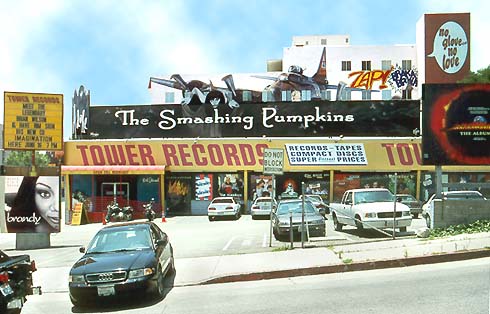
The famed Tower store on Sunset Strip where music lovers. artists and the LA music industry bought their music.
Seeing All Things Must Pass, the 2015 documentary about the rise and fall of Tower Records, was an emotional haymaker of an experience. I spent 20 years of my life as one of Tower Records’ veteran employees: four years in the stores, then 16 years at Tower Records’ Pulse!, the monthly music magazine Tower gave away for free. So watching people who I knew very well talking onscreen about my former workplace brought back a lot of powerful memories. (See review here.)
Mostly, director Colin Hanks got it right. But there were some important players missing, and some of the magic that I feel made Tower Records a retail powerhouse was not fleshed out adequately.
One reason Tower did so well was that it was a decentralized operation. This meant that each store was relatively autonomous; stores were given a budget, but got to determine their own product mix – genres, hits versus deep catalog, majors versus indies, records versus eight-track tapes and cassettes.
I started working at Tower’s store in Stockton, California in February 1977. I’d been trying to get on there since the store opened in 1974, and finally got hired as store artist. I was tasked with drawing the signs that pointed out the stacks of albums in the center aisle along with displays, but soon got added to the register-shift rotation, which meant that I got a three-hour block to play whatever I wanted.
Some of us used this time slot wisely, reading the customers to determine what new releases to play, or playing records we believed in that we thought might catch on with some exposure. Others – namely a bloc of coworkers who were so enamored with the output of David Geffen’s Asylum label that they would refer to Linda and Jackson and J.D. and Don and Glenn on a first-name basis – would inflict three-hour doses of depressing L.A. cultivated-mustache music on our hapless customers.
“Jackson, let’s go get us a margarita,” our jazz buyer June Bug, who looked a lot like Saturday Night Live regular Garrett Morris, would say to me when the Asylum vibe would get too oppressive. Every Tower store was located in very close proximity to a bar by design, and we would knock back some cocktails, maybe smoke a doob in the parking lot, then go back to the store and spend three hours blasting classic ‘70s R&B – Stockton was a huge market for that – and proto-smooth jazz.
Bug was a ladies’ man, picking up women across the counter at the cash register behind the sultry sounds of the Crusaders or Grover Washington, Jr., which was hilariously impressive to watch. Often he’d disappear early in his shift, only to return at the end, completely wasted. The jazz section languished, naturally, and because I’d been using my register shifts to educate myself on the history of jazz, our manager Phil made me the jazz buyer for catalog titles.
That was the coolest thing about working at Tower: You could gain deep knowledge about any genre you wanted – jazz, classical, blues, world music, folk – and after you played a record, you’d send it to the back room to get fresh shrinkwrap, then re-filed in the racks.
Theoretically, the labels provided albums for in-store play, or promos, but the reality, at least for those of us in the trenches, was that the manager, the rock buyer and the rest of the day shift grabbed all the good promos, leaving behind a smattering of MCA (“Music Cemetery of America”) and Mercury (“Kiss of Death Records”) new releases – typically, beer-saturated Canadian thud-rock bands from Manitoba, Saskatchewan and Alberta. (This all would change, of course, when I moved into the corporate office by taking a job at Pulse!, which got me onto the mailing lists for freebies from pretty much all every record label.)
Occasionally I’d get lucky, like the time I brought home an MCA cut-corner by a guy I’d never heard of, fired up a pipeload, cracked a beer, dropped the needle on Honky Tonk Masquerade by Joe Ely and subsequently had my mind blown.
But that was rare. Sometimes we’d schmooze the sales reps, or help them take in-store catalog inventories, or maybe offer them some smoke or a line, and they would reciprocate by letting us pull some choice promos from their car trunks. Or, we could charge albums to our personal accounts, which was deducted from our paychecks, at maybe 30 percent off of list price. But usually, the discounts a lot of us took were of the five-fingered variety.
It was an interesting time to be working in retail, because there was a tectonic shift happening in the distribution world, which would accelerate once CDs became the preferred format and the purchase of catalogs became a roadmap toward increased market share. The other major distributors – ABC, Capitol, MCA, PolyGram, RCA/A&M/Arista – were combining forces to battle the two dominant juggernauts, Warner/Elektra/Atlantic and CBS. In addition, seemingly each week another mid-size independent label – Island, Chrysalis, Motown, United Artists, London, Buddah, Chess, et al. – would move to major distribution.
What this meant was that we would spend a lot of time pulling all the records of a label like Blue Note, which was part of United Artists, off the shelves to ship back to the indie distributors for credit, and then would have to hope that the new distributor, in this case Capitol, would reissue them. A lot of the less-popular titles would disappear, so we would pull our own copies from the returns.
I could go on about my stints in Las Vegas, Citrus Heights, a Sacramento suburb, and then, after getting fired from there for being drunk and sleeping in the blues understock, getting hired back in Stockton three years later, but maybe I’ll flesh those out in the book I’ve been working on.
In 1984, after six or seven months back at retail, I heard about a job in the main office in Sacramento, the city where Tower started, applied for it and got it. I’d had some writing experience and had a head full of record-store knowledge, so working as Editor & Publisher Mike Farrace’s editorial assistant at Pulse! wasn’t a complete overreach. The one thing that made it easy was Tower founder Russ Solomon’s vision of carrying the complete spectrum of music in depth and detail, to which we tried to adhere to the best of our ability.
As our staff grew, along with the roster of freelance writers who wrote for us, the one thing that I think set us apart was that we decided on pretty much everything we would cover by listening to the music. Not that other publications didn’t do that, but so much of what we were reading in other magazines was based on whatever story or narrative that an artist was presenting, rather than what was actually in the grooves. It wasn’t that we did it better, just differently.
The remarkable thing was that Pulse! was free, and supported by label advertising, which gave advertisers sale pricing and positioning for new titles in the stores. But we were, for the most part, free to cover what we wanted. Having Russ at our back was a big part of that.
It was a great ride while it lasted. Thank you, Russ Solomon.
Tower merch is available here.
Related: Interview with Russ Solomon

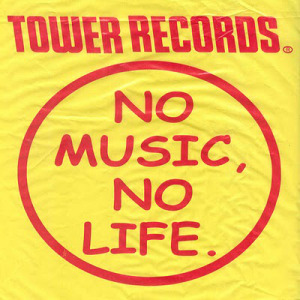
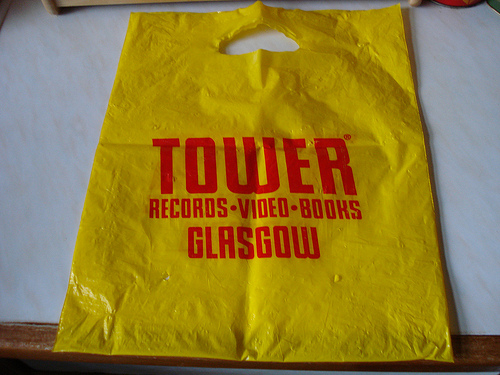
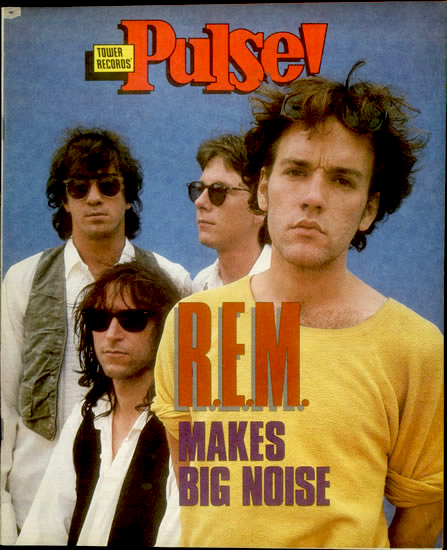
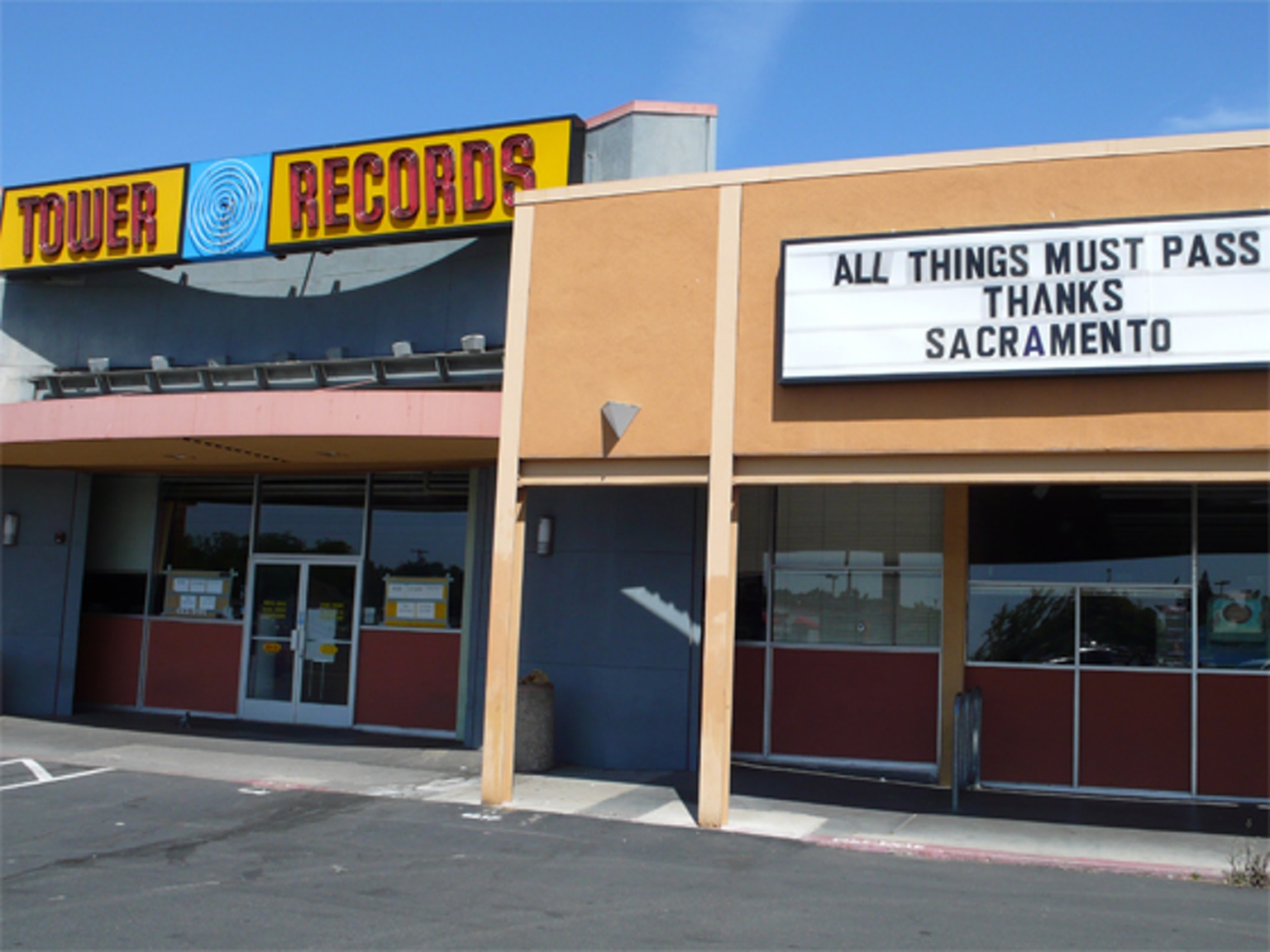
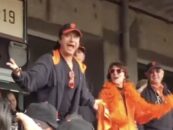

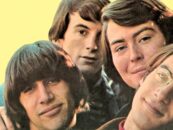
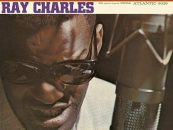

11 Comments so far
Jump into a conversationOMG, from Tower/Pulse to killing bugs. OMG…I was blessed to have a “previous incarnation” to fall back on when I left Tower after almost 12 years…I went to the new one in Nashville where I had the GM from hell…after working with TERRIFIC GM’s up to that point in New O and Denver. I studied Textile Design and worked in NY at that as well as doing textile conservation..I had taken up working at Tower as a “fill-in” for free-lancing and fell in love with it! Anyway, I was blessed to be able to get back to my looms when I threw in the towel for good. BUT< I miss Tower BAD!!!! Well…smash those bugs!
GREAT article! I am attending the Tower Records Reunion this weekend in Sacto where I will view “All Things Must Pass” for the 1st time. I will definitely keep your insights in mind while watching! Worked at Tower Records in El Toro, CA (now Lake Forest) for 14 yrs: 1984-1999.
Jackson, during the post-punk indie explosion I kind-of hung on your every word. You turned me on to lots of great stuff, even stuff from my own town. I worked (and still do) at the UW Bookstore in Seattle. Tower was across the street. It was a dark day when Pulse disappeared, and darker still when the store closed. I only bought one record; the scene was too macabre. (A cheap Donovan comp it was, BTW). Thanks for everything, your writing made a difference…
Mike
Tower was a magical place. I spent SO much money there happily. I spent every spare cent there for many years and met some of my best friends there. I found some of my best music because the employees knew my taste so well, sometimes they’d say “buy this and I’ll take it back if you don’t like it.” I always liked it. Magic place if you found the right Tower (mine was on Bascom Avenue in Campbell and Scott was my man in the ’70s and became a good, good friend).
Was there a Tower Record Store in Philly?
I know there was a Tower Theater.
There was one on South Street where the Ripley Music Hall had been, and another on Roosevelt Blvd.(Route 1) in NE Philly.
I kind of liked the Canadian thud-rock bands from Manitoba.
We all have sinned . . .
Thanks for the great article.
Your listeniing to Jazz in Sacramento in 1977 no wonder Tower went out of business
The Tower Records story was the West Coast version of The Record Bar story in the Southeast. The primary difference being that we were mostly mall-based. The experiences, however, were much the same. Owner Barrie Bergman had the same vision as Russ Solomon regarding full-range of genres, deep catalog, and store independence. It was the best 33 years of my working life.
Worked at your competitor Wherehouse Records 1979/1980. Got fired for stealing records along with four others. Was interviewed and given a lie detector test by the same guy who administered Patty Hearst’s. Best job I ever had with the most ungodly low pay. Good times
At one time there were 3 Tower stores in Philly…South St., Broad and Chestnut Sts., and Roosevelt Blvd. Plus across the bridge in Jersey there was the Cherry Hill store…and then the KIng of Prussia store in Montco.